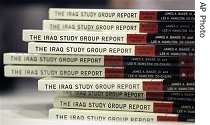2006年VOA标准英语-Iraqi Kurdish PM Discusses ISG Report, Iraqi Oi(在线收听)
By Margaret Besheer
Irbil, Iraq
09 December 2006
The report published this week by a bipartisan U.S. panel urging policy changes in Iraq has not been warmly received in northern Iraq's semi-autonomous Kurdistan region, particularly its recommendation on how Iraq's oil wealth should be distributed. VOA's Margaret Besheer sat down with the regional prime minister, who says the report does not reflect realities on the ground.
 |
| Iraq Study Group report |
But the prime minister of the semi-autonomous region, Nechirvan Barzani, tells VOA that is no reason for the U.S. commission reviewing U.S. policy in Iraq to have neglected visiting the area when they were preparing their 79 recommendations for President Bush.
"They stayed just inside [the] Green Zone, and [for] just a few days inside the Green Zone," he said. "They did not come to Kurdistan, or to anywhere, to see the real situation on the ground."
The Green Zone is a secure area in Baghdad where U.S. troops and government officials are housed.
Mr. Barzani is particularly upset about the Iraq Study Group's recommendations for dividing the country's oil wealth, particularly as there are sensitive internal negotiations going on now in Baghdad to draft a new national oil law.
Iraq possesses more than 100 billion barrels of proven oil reserves, so the stakes are high.
The Iraq Study Group's report urges equitable distribution of oil revenues, saying it is necessary to the process of national reconciliation. This option is attractive to Iraq's minority Sunni Arabs.
But Iraq's Kurds, including Mr. Barzani, and also its majority Shi'ites - who sit on much of the country's oil reserves - oppose this, preferring instead to follow the Iraqi constitution, which allocates all regions of Iraq a proportion of oil profits relative to their population.
The Kurds are generally considered to be 17 percent of the population. However, if an expected census is conducted next year, Mr. Barzani says their share is more likely to increase than decrease.
"Our point is, because we do not have any census in Iraq, we told Baghdad, you should keep 17 percent for the Kurds, until you finish that census, and then, according to the constitution, it will be adjusted, and we will accept that," he added.
He says Iraqi oil revenues should also go to a special account outside the country, which would automatically transfer their share from that account directly to the regional government's account.
In Baghdad, as the new oil law is hashed out, the version the Kurds would like to see approved would allow them to retain the right to sign oil deals with foreign countries and keep the proceeds for themselves, which they contend is their right under the Iraqi constitution.
Negotiations on the draft oil law will resume this week, and Mr. Barzani will go to Baghdad to take part.
Also on his agenda there is the annual budget. Right now, he says, the Kurdistan region does not receive any of the money allocated for national security, something he would like to see changed.
"Our point is, we are part of the security in Iraq, and they should allocate some budget for security in this region," he said. "You should give us our share. If the situation here is good, it is because we try hard to be like that. We need more help, more assistance."
Mr. Barzani said he was disappointed that the last round of Baghdad talks did not yield any significant results, but he tells VOA, he is hopeful that this trip will see some of these issues resolved.